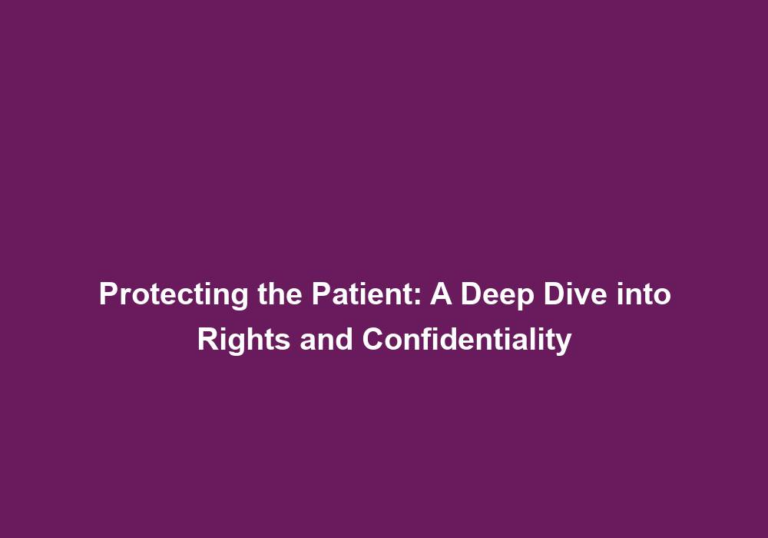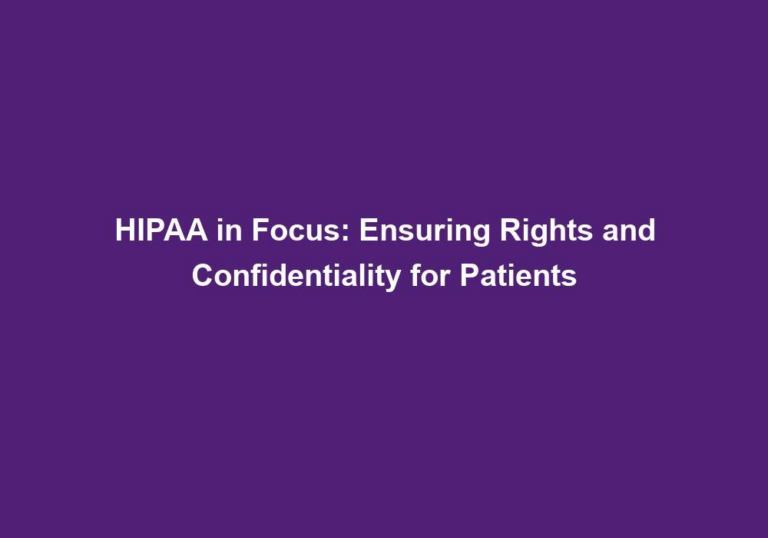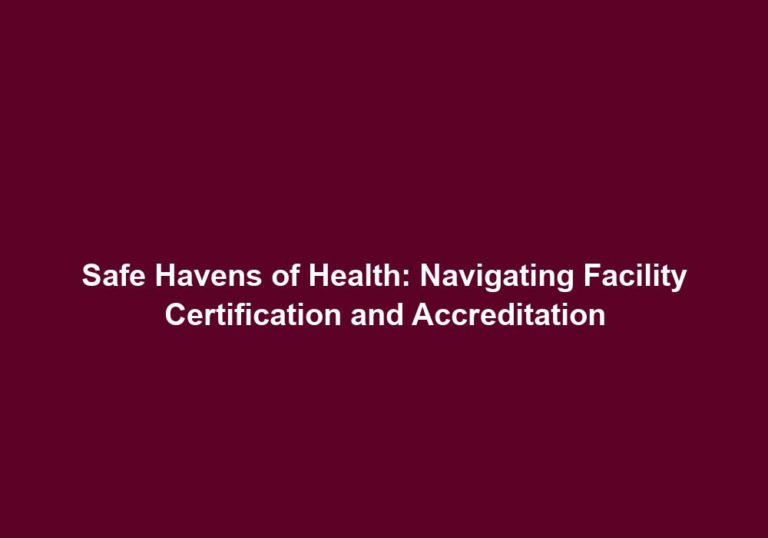Guardians of Trust: Ensuring Patient Rights and Maintaining Confidentiality in Healthcare
In the realm of healthcare, ensuring patient rights and maintaining confidentiality is of utmost importance. Healthcare professionals, including doctors, nurses, and administrators, bear the responsibility of upholding a guardian-like role, safeguarding the trust placed in them by patients. This article delves into the significance of patient rights and confidentiality in healthcare, highlighting the measures and practices that healthcare providers must implement to fulfill this crucial role successfully.
The Essence of Patient Rights
Patient rights encompass a set of ethical and legal guidelines that protect individuals seeking medical care. These rights are designed to promote the well-being, autonomy, and dignity of patients, ensuring they receive appropriate healthcare services in a respectful and equitable manner. It is imperative for healthcare providers to understand and respect these rights to foster a patient-centered approach.
1. Right to Informed Consent
One fundamental patient right is the right to informed consent. This means that patients have the right to be fully informed about their medical condition, proposed treatment options, potential risks, and anticipated outcomes. By engaging in transparent and thorough discussions with patients, healthcare providers ensure they have the necessary information to make informed decisions about their healthcare.
- Healthcare professionals should explain the nature of the medical condition to the patient, using clear and understandable language.
- They should discuss the available treatment options, including the benefits, risks, and potential side effects associated with each option.
- Patients should also be informed about the expected outcomes of each treatment option, allowing them to weigh the benefits against the potential risks.
- It is essential for healthcare providers to answer any questions or concerns the patient may have, ensuring they have a complete understanding before giving their consent.
2. Right to Privacy and Confidentiality
Privacy and confidentiality are vital aspects of patient rights, integral to building trust between healthcare providers and patients. Patients have the right to expect that their personal information, medical records, and conversations will be treated with the utmost confidentiality. Healthcare professionals must adhere to strict confidentiality guidelines and ensure that patient information is securely stored and accessible only to authorized individuals.
- Healthcare providers should implement robust privacy practices to protect patient information from unauthorized access or disclosure.
- This includes secure storage and transmission of medical records, using encryption and password protection.
- Access to patient information should be limited to authorized personnel who require it for providing healthcare services.
- Healthcare organizations should also conduct regular audits to identify any vulnerabilities in their privacy practices and take necessary steps to rectify them promptly.
3. Right to Quality Care
Patients have the right to receive high-quality healthcare services that align with current standards of care. This encompasses receiving timely and appropriate medical treatment, being treated with respect and dignity, and having access to competent healthcare professionals. Healthcare providers must prioritize continuous professional development to stay updated with the latest advancements and deliver optimal care to their patients.
- Healthcare professionals should stay abreast of the latest medical research and advancements in their field to ensure they provide the most up-to-date and effective treatments.
- They should strive to deliver care in a timely manner, minimizing any delays that may negatively impact the patient’s health outcomes.
- Treating patients with respect and dignity involves actively listening to their concerns, addressing their questions or fears, and involving them in their treatment decisions.
- Healthcare providers should also ensure that they have the necessary skills and expertise to provide competent care, seeking additional training or consultation when needed.
4. Right to Non-Discrimination
All patients have the right to be treated without discrimination based on race, gender, age, religion, sexual orientation, or any other characteristic. It is essential for healthcare providers to create an inclusive and welcoming environment that respects the diversity of their patient population. Every patient should receive fair and equitable treatment, ensuring that their unique needs and perspectives are considered.
- Healthcare organizations should have policies and procedures in place to prevent discrimination and promote equal treatment for all patients.
- Staff members should undergo training on cultural competence and sensitivity to ensure they can effectively communicate and provide care to individuals from diverse backgrounds.
- It is important for healthcare providers to be aware of any biases or prejudices they may hold and actively work towards overcoming them.
- By fostering an inclusive environment, healthcare providers can create a safe space where patients feel comfortable disclosing relevant information and seeking necessary care.
Safeguarding Patient Rights: Best Practices
To fulfill their role as guardians of trust, healthcare providers must implement various best practices to safeguard patient rights and maintain confidentiality. These practices include:
1. Comprehensive Training and Education
Healthcare professionals should undergo comprehensive training and education on patient rights and confidentiality. This ensures that they understand the legal and ethical obligations associated with their profession and provides them with the necessary knowledge and skills to address patient concerns effectively.
- Training programs should cover topics such as informed consent, privacy and confidentiality, quality care standards, and non-discrimination.
- Healthcare providers should be familiar with relevant laws, regulations, and guidelines governing patient rights and confidentiality.
- Continuing education opportunities should be provided to ensure healthcare professionals stay updated with any changes in best practices or legal requirements.
2. Clear Communication Channels
Establishing clear communication channels is crucial for fostering trust and ensuring patient rights are respected. Healthcare providers should communicate openly and honestly with patients, using clear and understandable language. This enables patients to actively participate in their healthcare decisions and promotes a sense of partnership between the patient and the healthcare team.
- Healthcare professionals should use plain language when explaining medical conditions, treatment options, and potential risks to patients.
- They should encourage patients to ask questions or seek clarification, ensuring they have a complete understanding of their healthcare plan.
- Effective communication also involves active listening, empathy, and respect for the patient’s concerns and preferences.
- Healthcare providers should consider implementing patient portals or other digital communication tools to facilitate easy and secure communication between patients and healthcare teams.
3. Implementing Robust Privacy Practices
Healthcare providers must implement robust privacy practices to protect patient information. This includes secure storage and transmission of medical records, strict access controls, and regular audits to identify and rectify any vulnerabilities. By safeguarding patient data, healthcare providers strengthen patient trust and maintain confidentiality.
- Electronic medical records should be encrypted and stored on secure servers to prevent unauthorized access or data breaches.
- Access to patient information should be restricted to authorized personnel, with unique user accounts and strong passwords.
- Healthcare organizations should conduct regular audits to assess the effectiveness of their privacy practices and identify any areas for improvement.
- Staff members should receive training on data privacy and security protocols, including how to handle patient information safely and securely.
4. Continuous Quality Improvement
Healthcare organizations should embrace a culture of continuous quality improvement to ensure that patient rights are upheld consistently. This involves regularly reviewing policies and procedures, soliciting feedback from patients, and making necessary adjustments to enhance the patient experience and protect their rights.
- Regular audits and assessments should be conducted to evaluate the effectiveness of policies and procedures related to patient rights and confidentiality.
- Patient feedback should be actively sought and considered, through surveys, focus groups, or other means of communication.
- Any identified gaps or areas for improvement should be addressed promptly, with clear action plans and accountability.
- Healthcare providers should strive to exceed minimum standards and continuously seek opportunities to enhance the quality of care provided to patients.
Conclusion
In conclusion, healthcare providers play a pivotal role as guardians of trust in ensuring patient rights and maintaining confidentiality. By understanding and respecting patient rights, healthcare professionals can establish a patient-centered approach that prioritizes the well-being, autonomy, and dignity of individuals seeking medical care. Through robust practices, comprehensive training, and clear communication, patient rights can be safeguarded, fostering an environment of trust and mutual respect within the healthcare system.







